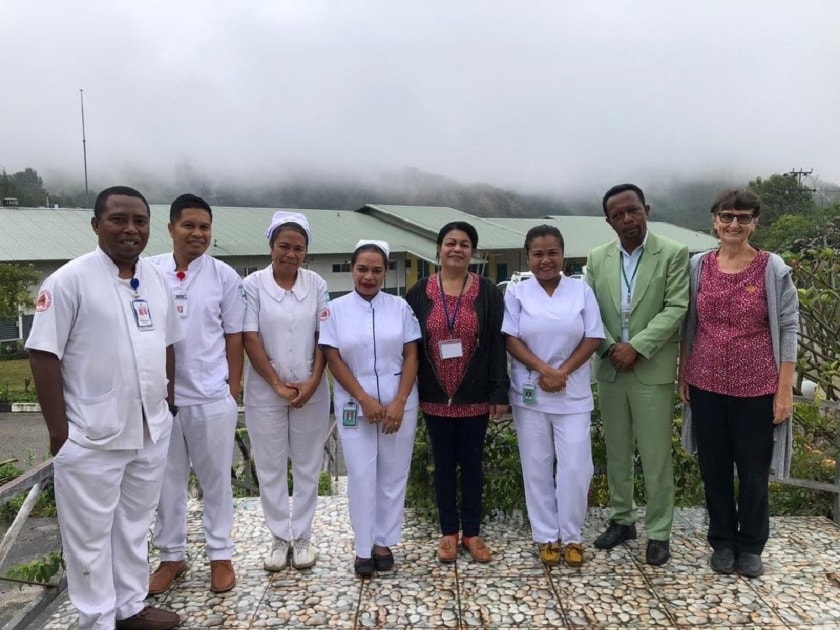Improving health care on the ground in remote communities starts at the top
4 Apr 2024

St John of God’s International Health team has learned a life-changing lesson about healthcare education that turns that thinking on its head. Municipalities Program Leader Margaret McDonald-Ashe explains.
Margaret has a wealth of public health and healthcare education experience in Australia, with a focus on rural and Indigenous communities. This experience was invaluable when she and her husband Paul – a long-time volunteer in Timor-Leste – moved to Dili in 2018, where Margaret joined our International Health team at the Hospital Nacional Guido Valadares (HNGV).
“I started out teaching healthcare educators at Timor-Leste’s national hospital, the HNGV, including a stint in the paediatric ward as a clinical mentor,” says Margaret. “We learned so much at the HNGV by working in partnership with the Ministry of Health – lessons that have made a real difference to healthcare delivery – so when I was offered the opportunity to apply these lessons in the municipalities (rural regions), I jumped at the chance.”
In 2023, Margaret took up a post at the small community hospital in Maubisse – a winding two-hour journey into the mountains from Dili – where she works as the Municipalities’ Team Leader, helping local nurse educators deliver the Core Competency Program as part of our Nursing Development Program.
“We focus on five key areas or core competencies: professional practice, IPC (infection prevention and control), medication safety, patient assessment and basic life support,” says Margaret. “My job is to train the hospital’s educators to train their peers. But that’s not where we start.
“First, we conduct an audit to establish a baseline. We need to be able to measure the progress we make. And crucially, we established a technical working group with the hospital’s management team; at the HNGV we learned that we really need to work with management first to get that buy-in and prepare the ground. There's no point talking to nurses about hand hygiene if you haven't got a sink that works. Management has to make these things happen. And when the nursing staff see that the management team is on board, motivation and ownership soars.”
This sense of ownership, motivation and the flow-on effects are clear to see. The majority of executive staff at the hospital participated in the St John of God’s International Health Manager Program and have an understanding of good management practice, including how to perform quality improvement activities. Management therefore supports nursing staff to make quality improvements within the hospital, as one quality improvement project shows.
“As part of the Professional Practice Core Competency, we ask the nursing teams to undertake a quality improvement project – an opportunity to develop and implement an initiative that improves healthcare delivery or the patient experience,” explains Margaret. “And the nurses went to town! They were so good at it, so keen. Some even put their own money into it, which is quite something in a community where people don’t have much money.
“For example, we look at ‘risk’ in professional practice. Now, this is a small rural hospital where oxygen is only available in cylinders – it’s not plumbed through the wall – and while the cylinders should be stored securely to avoid the obvious risks, they weren’t. The ward manager went out and bought small link chains and hooks to secure the cylinders and the educator put signs up in Tetun (the native language) explaining how to store them and change them, and so on. So, that’s now an established, safer system.
“Another example: there was no orientation for patients – a simple introduction for new patients pointing out where the toilets are, when they will get their meal and so on. One of our educators, in collaboration with the ward manager, developed an orientation checklist. Another developed a pre-operation checklist.”
Interestingly, Margaret and the International Health team have found that this collaborative approach, where everyone – our team, the nurses, doctors, and management – engages through a working group, leads to learning moments everywhere, not just in hospital wards.
“For instance, we used to conduct the surveys to track progress against our baseline audit; now, the local team has the tools and template to do it themselves, with background support from us. I used to take minutes for our working group meetings; now, the staff do it – I have the Tetun minutes translated into English rather than vice versa.
“And because these changes are driven by the team – with the backing of management through the technical working group – they become established systems. In this way, our values and the values of the Ministry of Health become embedded in the culture. It fundamentally transforms healthcare equity, accessibility, quality and patient outcomes. I see it on the ward every day. It's wonderful.”
For more information about St John of God International Health, visit International Health (sjog.org.au).
You may be interested in
